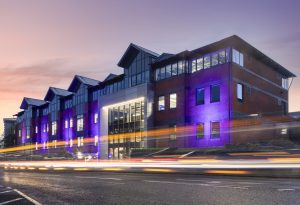Halliwells crisis – property deals in focus

PROPERTY deals struck by the partners when Halliwells moved into Manchester’s Spinningfields business district lie at the heart of the law firm’s woes.
The firm, which has debts of £25m, is paying more than £5m a year in rent on 3 Hardman Square, and this sum is due to rise further in two years.
This rent on the 180,000sq ft building- which will be increased to just over £6m per year from March 2012 – has become a millstone around its neck.
In a statement last week Halliwells blamed its predicament on “high property costs exacerbated by the current economic climate which affected the profitability of the firm”.
It is expected that is one of the first things that Hill Dickinson – which is in talks to take on Halliwells’ assets – will try and renegotiate terms with landlord Credit Suisse Asset Management, if a deal can be agreed.
While Halliwells won’t be alone in having signed a long-term deal on a new property at the height of the boom, questions are being asked about some other decisions taken by senior bosses.
Since news that the firm is set to go into administration TheBusinessDesk has been contacted by a number of creditors critical of the way the firm has been run.
At the heart of this is a move by the equity partners to take millions of pounds out of the business.
TheBusinessDesk has learned that the firm received around £20m from Spinningfields developer Allied London.
It is understood this was made up of two tranches of cash – equivalent to three years of free rent – and a further sum when Allied London sold the building.
According to property insiders Halliwells, which only ever actually needed around half of the space at 3 Hardman Square – took on the lease for the entire building in return for 25% of the profits if the property was sold. This duly happened in 2006-7.
When the recession hit – and income from hitherto boom areas – such as property and corporate collapsed – Halliwells had to borrow to shore-up its finances.
A number of partners who received a share of the property windfall, had retired or resigned after taking their share, and were therefore not available to put money back into the business.
In addition once news of the payment spread to the non-equity partners, there was considerable anger, which sparked a stream of departures.
One North West creditor, owed thousands of pounds, told TheBusinessDesk: “Questions should be raised about what went on there. It is greed and self interest taken to the extreme.”
The Halliwells crisis has sparked huge debate in Manchester legal circles, with many professionals asking ifs failure is a one-off.
Mark Briegal, partnership law expert at Manchester firm, Ralli, summed up the mood: “This is a sad story for Halliwells, the people who work there and Manchester’s legal sector, but it seems that Halliwells’ problems relate more to business strategy and management rather than anything to do with the legal sector.”
He added: “It’s too early to know exactly what happened at Halliwells, but it seems they took on too many costs without sufficient income to cover them.
“In any market over-expansion at the wrong stage of the cycle can be catastrophic. Partners in firms need to ensure their business model is sound and that their drawings do not exceed their earnings.
“The partners (or members as we should properly call them) will be pleased Halliwells is an LLP although we don’t know whether RBS took any personal guarantees from members when they refinanced the business.”







